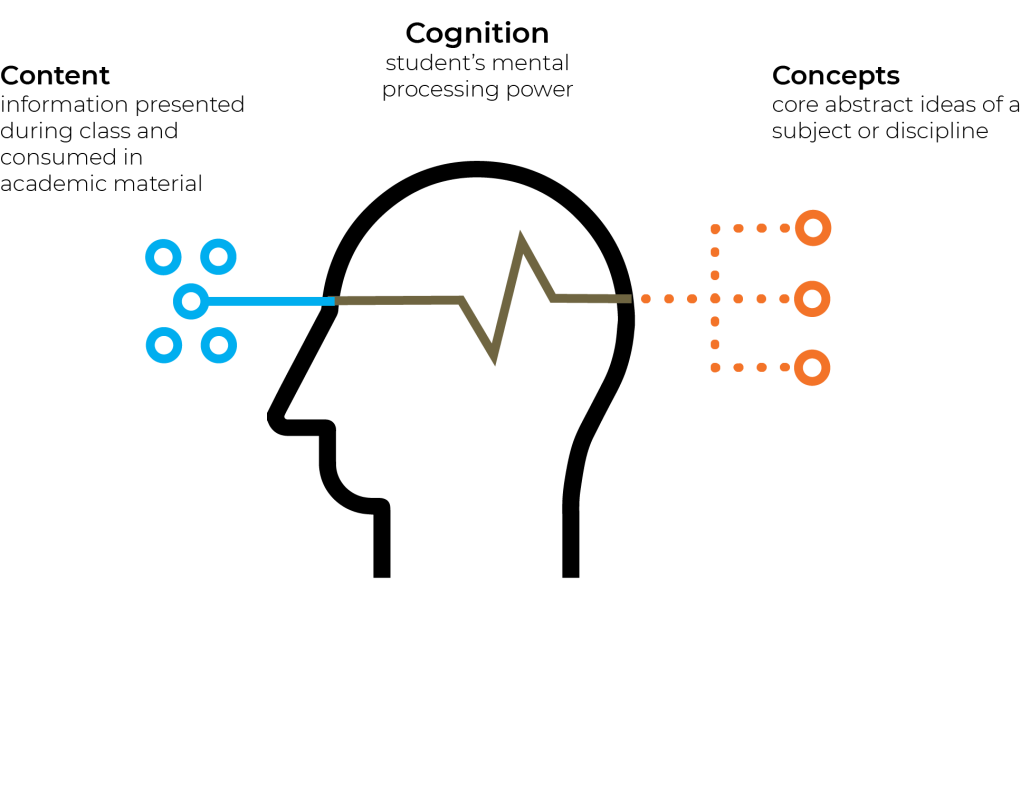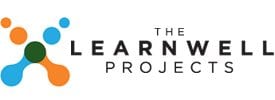Far too many students needlessly struggle their way through college. They study to the best of their abilities, but their grades simply don’t improve. Why does this happen? Students who can’t find their groove in college have never learned the basics about academic work. Here’s a quick crash course to help students succeed using the foundational components of academic work.
Step 1: Teach students the elements of academic work.
Academic work consists of three elements: content, cognition, and concepts. The first step is simply to make students aware of each of these elements. They need to store this as declarative knowledge in their minds because much of their academic success hinges on their ability to properly coordinate these three elements.
Step 2: Separate the elements.
The next step beyond knowing that these elements exist is knowing the distinct contribution that each adds to academic work. The following list shows each element’s role in academic work.
- Content consists of the information presented during classes and consumed as students read academic material. Content comprises the building blocks of academic work.
- Cognition is the mental processing power students use to transform content into conceptual knowledge. Cognition provides direction to students’ academic work.
- Concepts are the core ideas of a subject or discipline. They are the abstract notions that the content is expressing. Concepts are the destination for academic work.
Step 3: Integrate the elements.
Once students know how each element works in isolation, they must then be able to fuse them together into actionable work statements. For example, related rates, velocity, and derivatives are concepts that students will encounter in a calculus course. Educators will use content, such as words, numbers, symbols, formulas, and so forth to communicate the ideas. Unsuccessful students will spend lots of time working through individual problems and checking their notes for accuracy. While such tactics may ensure students can solve individual problems, they do nothing to ensure students learn the more meaningful concepts. If students are to develop the conceptual understanding that their educators seek, then they must know how to use their cognitive skills to convert the content into conceptual knowledge. Thus, they better know how to integrate the three C elements.
Step 4: Teach students to use their metacognitive powers.
College students have a superpower at their disposal: metacognition, which they can use to coordinate the three C elements. Metacognition involves knowledge and awareness of our internal processes, states, and conditions as we process information and navigate tasks throughout learning environments.[1]
Students and educators should know how to manage the three C elements as you interact with them during and away from class. Those who use their metacognitive powers well will enjoy a huge academic advantage. Those who don’t may find themselves working hard but not producing good results.
Follow the four steps above to ensure students have the proper perspective on academic work.
Assignment to Help Students Succeed
Here are a few questions you can ask students to get their minds right for academic work:
- Which of the three elements do you typically focus on?
- Which of the three elements poses the greatest challenge to you?
- How will you account for each of the three elements moving forward?
[1] Hennessey, M. (1999). Probing the Dimensions of Metacognition: Implications for Conceptual Change in Teaching-Learning. National Association for Research in Science Teaching. Boston; Kuhn, D. &. (2004). A Bridge Between Cognitive Psychology and Educational Practice. Theory into Practice, 268-273; Martinez, M. E. (2006). What Is Metacognition? Phi Delta Kappan, 696-699.
Blog Post Feedback
In my next post, I’ll share the one indispensable academic work skill that every student needs but that practically every student lacks.
Let’s chat. Leave a thoughtful comment below, and I’ll send you the following pdf version of this article. It’s a great conversation piece for faculty, staff and students.


I find it helpful to teach the three Cs as content in the third week of the semester when teaching a college success course. Once I’ve shared this information, I ask them to refer to the previous week to dissect the presentation of the content and the activities provided. The challenge for me is to help them consider this information as if they’ve never heard it before, since our middle and high schools consistently teach the learning process.
Hi Sheryl,
Nice contribution to the post! I agree that students would be much better prepared for college work (and K-12 work) if they understood each of the three C elements and the role they play in academic work. My forthcoming book on how to properly transition students into college focuses on when the Three Cs should be taught. Our timing is similar:)!
Thanks for you comment. I will send you the PDF article.
Thank you, Leonard, for this reminder about the importance of metacognition. In my composition courses, I use articles on metacognition, habits of mind, and growth mindsets to encourage students to think about their thinking, their attitudes toward learning, and the relationship between what they learn in my class and the rest of their academic journey. It’s important that students capture what they are thinking about a text as they read, and this helps them to retain more and have ideas to write about in response to those texts. They become more effective readers and writers because they have actually engaged with the texts; it’s metacognition in action! It also helps them in life as they become more aware of their thoughts and responses to assignments, to people, and to circumstances.
Hi Joan,
I’m really attracted to the way you use metacognition with students. So many educators and students limit the construct to thinking about thinking, and in doing so, they don’t experience the full benefits. When students realize their hidden metacognitive superpower, they become superior learners in school, in the working world, and life. Here is an article showing how metacognition is even a force, perhaps the best, against political polarization: https://www.tandfonline.com/doi/full/10.1080/15534510.2020.1760129.
Thanks for taking the time to share your experiences!
I’ll send you the pdf article. Feel free to share with others!
It is also incumbent on us as teachers to repeatedly relate Big Picture concepts to our students. In Western music, we boil it down to tension and release (repetition vs. contrast). Then show how everything you learn from harmony to form to rhythm supports these concepts. I wish someone had shown me the Big Picture for chemistry (change and reaction–and the building blocks of everything!) or calculus (how to calculate things that change) and other subjects (and also how they relate to each other). You shouldn’t wait for an “advanced” class to get into the motivation for the subject.
Hi Tamara-
I really like the music analogy. To increase student success in any course, students must know the destination (e.g, outcomes) and they need cognitive direction, which thinking skills to enact on the content. Without these two elements settled in their minds, then students will waste their time learning the content while missing the more meaningful concepts. Students should learn this at a very early age.
Thanks for your input.
I believe it is important to help students understand the various ways in which the demands of college are different from their high school experience. Certainly not all, but some students, have found it easy to earn good grades in high school without having to work hard or push through a learning barrier. This may be because they are naturally gifted in an area that is “easy” to them or they were required to simply memorize material. Some of the “A” students can struggle because they don’t understand the different requirements of college work. Learning the power of metacognition is critical.
Hi Brenda-
Thanks for kicking off the conversation with such a thoughtful comment. Here’s my take on things: The typical high school/homeschool student has a variety of tactics for capturing, storing, and retrieving content. We typically classify these as “Study skills.” I believe that nearly all the skills students bring to college are content-focused skills. These skills benefit them in less cognitively challenging courses.
The primary academic advantage students from reputable high schools, prestigious private schools, and boarding schools have is their exposure to more and “better” content. This content familiarity benefits them to some degree in courses. But it does not help them learn concepts to which they have never been exposed. Learning entirely new concepts requires metacognitive skills.
Neither group of students have the metacognitive and conceptual skills needed to do cognitively complex academic work. For example, the ability to differentiate among thinking skills is as fundamental to academic world as differentiating between monetary values is for the financial economy. Yet, students are not taught this essential threshold skill.
Check out this video on this specific metacognitive skill: https://www.youtube.com/watch?v=ADgj2caRHEU.
I’d love to hear your feedback.
Thanks,